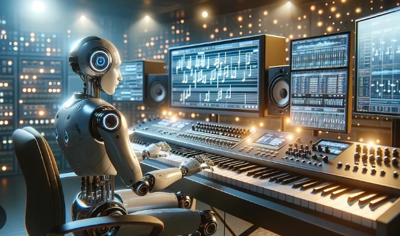
In each generation, music has reflected the rhythm of society—its victories, anxieties, revolutions, and hopes. From tribal drums pulsating under starry skies to vinyl records telling stories of rebellion, to the infinite scroll of Spotify playlists today, our collective soundtrack keeps changing. But in 2025, music is no longer written by humans alone—it is being re-made with machines. This shift is not simply technical, but philosophical, affective, even existential. We are on the cusp of a quiet revolution, one which does not proclaim change from rooftops, but whispers it softly through headphones, behind algorithms, and in neural nets.
A Symphony of Shifting Paradigms
For centuries, composition was bound to instruments, notation, and the human hand. Bach, Mozart, and Coltrane all composed within the limitations of physics and time. Even in the midst of the electronic revolution of the 20th century, music's lifeblood was always governed by human intention. But the emergence of artificial intelligence has imagined a new kind of composer—one without body, soul, or even heartbeat.
Algorithms that were trained on thousands of songs can now generate symphonies, ambient soundscapes, hip-hop beats, and even emotionally resonant melodies. And here's the twist: sometimes they produce something that moves us not because we're awed by the tech, but because we do feel something. Perhaps it's awe, perhaps it's disorientation, perhaps it's unease, or perhaps even nostalgia, but the sensation is real.
The Rise and Resonance of AI music
Inserting AI music into our cultural fabric isn’t just about automation—it’s about augmentation. We’re seeing collaborations where artists feed their own discographies into AI models to generate potential futures for their sound. Imagine Kurt Cobain’s voice resurrected through machine learning, or jazz improvisations that echo Miles Davis, but born from an AI system trained on improvisational logic.
There is something uncanny about it, not merely because it skims the edge of the uncanny, but because it goes against a deep-seated presupposition: that music has had to come from human feeling in order to have any meaning. But what if this isn't quite so?
Just as photography didn't kill painting, AI music isn't eliminating human musicianship—it's opening up the sandbox of creativity. Musicians are tapping into these technologies to overcome their own routines, mired out of creative constipation, or to venture into sonic territories that they might not have otherwise. The AI isn't taking the artist's job; it is becoming a collaborator, a reflection, even a disruptor.
Of course, there are also many ethical and philosophical questions. Who does a song belong to if it is composed by a neural network? Is it exploitation to copy the work of a dead artist? And more generally, are we comfortable with machines that can imitate not only what we do, but what we intend?
What Does this Mean for the Listener?
This isn't just an issue for developers and producers. It's about the rest of us—the fans, the listeners, the ones who weep along with a break-up song or dance to the rhythm that thumps like our own heart. When AI joins our playlist, will we even notice? Will we even care?
Others tell us not yet. Algorithms control our listening more than ever before, our tastes decided behind the scenes by them. It may soon be immaterial whether the song you're listening to was written by a human being, an artificial intelligence, or both—if it resonates, we let it in.
And yet the counter-trend exists. In an era full of made things, the raw, the rough, the human is a kind of luxury. We shall miss the wobbly warbling, the off note, the lo-fi authenticity no algorithm quite replicates.
The Rise and Resonance of AI music
Inserting AI music into our cultural fabric isn’t just about automation—it’s about augmentation. We’re seeing collaborations where artists feed their own discographies into AI models to generate potential futures for their sound. Imagine Kurt Cobain’s voice resurrected through machine learning, or jazz improvisations that echo Miles Davis, but born from an AI system trained on improvisational logic.




(0) comments
We welcome your comments
Log In
Post a comment as Guest
Keep it Clean. Please avoid obscene, vulgar, lewd, racist or sexually-oriented language.
PLEASE TURN OFF YOUR CAPS LOCK.
Don't Threaten. Threats of harming another person will not be tolerated.
Be Truthful. Don't knowingly lie about anyone or anything.
Be Nice. No racism, sexism or any sort of -ism that is degrading to another person.
Be Proactive. Use the 'Report' link on each comment to let us know of abusive posts.
Share with Us. We'd love to hear eyewitness accounts, the history behind an article.